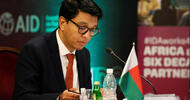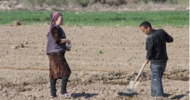Swedish TV4 said H&M was using cotton from areas in Ethiopia vulnerable to land grabbing -- the buying or leasing of land in developing countries, often by foreign companies, without the consent of affected local communities.
Karturi Ltd, the Kenyan flower production unit of Karuturi Global, is in financial collapse and been put under receivership. One of the world's most infamous landgrabbers is in its deepest trouble yet.
- TJN et al
-
14 February 2014
Dr Fahd bin Abdulrahman Balghunaim, minister for agriculture for the Kingdom of Saudi Arabia, speaks to This is Africa about the government's strategy in Africa.
- This is Africa
-
08 June 2012
"We are using knowledge and resources from Latin America and North America, capital from this part of the world (India) and land from Africa to make hopefully a heady cocktail,"says Sai Ramakrishna Karuturi
Abu Dhabi's Jenaan Investment owns and leases properties in Egypt and Sudan, as well as leasing land in Tanzania, Ethiopia and the US.
- The National
-
25 November 2010
The UPA Government has deprived job opportunities to millions of illiterate and semi-literate Indians by forcing Indian companies to invest abroad in overseas plantations and coal mining sectors.
- Organiser
-
13 October 2009
Dutch flower growers who dominate the flower farms in Kenya are being accused of avoiding taxation while proudly wearing the “fair trade” badge.
Despite all the hypocritical calls and posturing of the International Monetary Fund and the World Bank for ending hunger, they have facilitated, enabled, and led the global rush for landgrabs
To Karuturi, who has also offered to grow up to one million tonne of lentils for India on farm tracts leased in Ethiopia, the Mozambique model is an example of "political correctness."
- The Telegraph
-
19 July 2016
FT correspondents report on the global race for land from Ethiopia, Myanmar and Indonesia.
- Financial Times
-
01 Mar 2016
Move to seek an extension of AGM date comes after a series of issues it has been facing at its expansive roses farms in Kenya and allegations of land grab at its ambitious agriculture foray in Ethiopia.
- Business Standard
-
18 September 2014
Land grabs in Africa could herald a new dystopian age of hunger
- African Renaissance
-
12 May 2014
In five short years, rich countries have acquired about 80 million hectares of land in Africa and other developing countries in what is now a worrying trend.
- Africa Review
-
01 Mar 2014
Foreign investment in African land has been greatly fostered by the Indian Government and its business associations.
- Hindu Business Line
-
06 May 2013
The African agriculture sector is showing signs of improvements attributed to BRICS investment flows in smaller agricultural projects, reversing the trend triggered by the global food crisis in 2008.
Thousands of Ethiopians are being driven off their ancestral land that the government's selling without their consent to foreign investors buying up vast swathes of farmland, a U.S. watchdog reports.
This article calls into question the depth and effectiveness of a regulatory approach arguing that problems underlying large-scale land deals are so deep constituting socio-institutional problems of power asymmetry, exclusion and invisiblization, than just investment externalities or regulatory challenges.
This piece is part of "Water Grabbers: A Global Rush on Freshwater", a special National Geographic News series on how grabbing land—and water—from poor people, desperate governments, and future generations threatens global food security, environmental sustainability, and local cultures.
- National Geographic
-
14 December 2012
African nations like Zambia, Ethiopia and Mozambique invited Indian investors to invest in various sectors, especially in agriculture, saying this has the potential to provide food to both Africa and India.
India, which doesn’t allow corporate farming domestically, has joined the growing list of countries going overseas to look for food security.
- Asia Sentinel
-
09 April 2012
Amid much talk about the need for "codes of conduct" to help regulate this new phenomenon, I found myself wondering whether Cecil Rhodes would have signed such a code. He probably would, and have then gone on to completely disregard it.
- Mokoro Newsletter
-
27 May 2010
Recently, Kanayo Nwanze, head of the International Fund for Agricultural Development, told a news conference: "It is the wrong language to call them land grabs. They are investments in farmland--like investments in oil exploration."
- Japan Times
-
29 April 2010
Rich food importers are acquiring vast tracts of poor countries' farmland. Is this beneficial foreign investment or neocolonialism?
- The Economist
-
21 May 2009
Some of the world's richest nations are coming to grow crops and export the yields, hoping to turn the global epicenter of malnutrition into a breadbasket for themselves.
- Los Angeles Times
-
28 September 2008
New research examining the geographical coverage of international investment treaties raises concern about how they might affect public action to address 'land grabbing'.
Arab countries are increasingly seeking to secure their food needs through an international strategy of land grabs which are often detrimental to local populations.
Ethiopians stormed the 17th Street Office complex of the World Bank in Washington DC, protesting the bank’s alleged support for land grab and ethnic cleansing by President Girma Wolde-Giorgis
- Daily Independent
-
23 April 2013
Reading between the lines, the Durban BRICS resolutions will support favoured corporations' extraction and land-grab strategies and confirm the financing of both African land-grabbing and the extension of neo-colonial infrastructure through a new 'BRICS Bank'
Rulli and colleagues estimate that global land grabbing is associated with the grabbing of 308 billion m3 of green water (i.e. rain water) and an additional grabbing of blue water that can range from 11 billion m3 (current irrigation practices) to 146 billion m3 (maximal irrigation) per year. To put these numbers in perspective, the average daily household consumption of water in the UK is 150 liters (0.15 m3) per person.
- 3quarksdaily
-
07 January 2013
African continent is the new destination for Indian agriculture companies, as more than 80 of them have invested over Rs 10,800 crore in commercial farming activities in under-developed countries of the region.
- Financial Chronicle
-
28 Mar 2012















